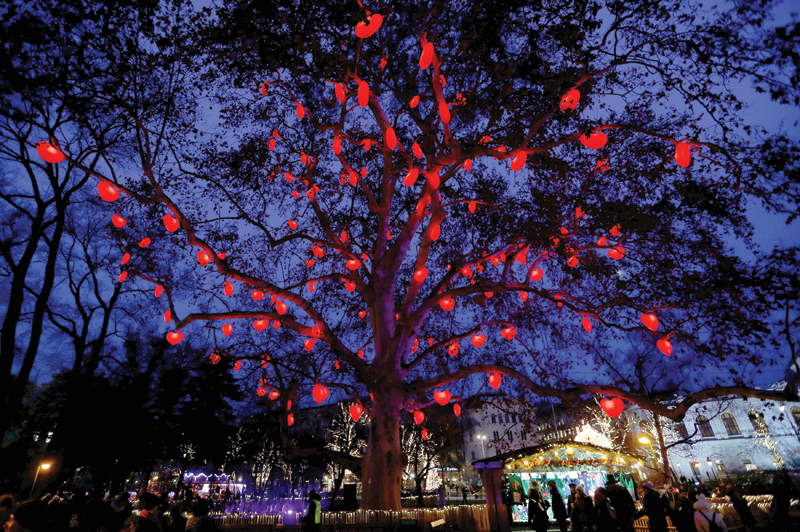

Albert Otti -
“Silent Night” is arguably one of the world’s best-known songs, as the Christmas carol has been translated into 300 languages from the Inuit tongue Inuktitut to Zulu in southern Africa.
Its popularity masks the strife and hardship that is woven into the history of the lullaby melody, composed and first performed two hundred years ago on Christmas Eve in the small Austrian town of Oberndorf. Here are four lesser-known facts about this carol that sings of “heavenly peace:”
FIRST THERE WAS WAR
When the people of Oberndorf near Salzburg first heard “Silent Night” during Christmas Mass in 1818, they were badly in need of some solace.
They were still recovering from the recent Napoleonic Wars that pitted France and its allies against a coalition that included Austria.
When the troops of French emperor Napoleon finally moved out of Salzburg, the occupiers left behind an impoverished region that had been forced to house, feed and finance the foreign soldiers.
“The population was bled dry,” Salzburg city historian Sabine Veits-Falk said.
THEN THERE WAS THE VOLCANO
Not long before “Silent Night” was first performed, there was a blast nearly 12,000 kilometres away in Indonesia that literally cast a cloud over Europe.
After the eruption of Mount Tambora in 1815, volcanic ashes travelled west and darkened the skies over Europe, leading to crop failure and famine in what is known as the “year without a summer” of 1816.
For the people in the Salzburg region, this came on top of the war.
“They hit rock bottom,” Veits-Falk said.
THE CAROL’S CREATORS
KNEW POVERTY
The lyrics were written in 1816 by local priest Joseph Mohr, who asked the schoolteacher and composer Franz Xaver Gruber to come up with a melody on December 24, 2018.
Mohr was the son of a poor, unmarried Salzburg woman who gave birth to four children from four different fathers.
Thanks to benefactors and a rudimentary welfare system in Salzburg that supported his promising talents, Mohr was able to attend high school and study in a theological college.
Gruber came from a poor family of linen weavers, born as the third son among eight children.
Despite his background, he was able to attend a college to become a teacher, a job that was paid poorly.
Gruber probably took on the additional job as organ player in Oberndorf as a source of extra income, according to Thomas Hochradner, a musicologist at the Mozarteum University in Salzburg.
WORKING MIGRANTS SPREAD “SILENT NIGHT”
The song’s journey into the world took a detour through the Austrian mountain region of Tyrol, through a Tyrolean church organ builder who heard the melody in Oberndorf and brought it back to his home valley of Zillertal.
In the early 19th century, many peasant families from the valley became travelling salespeople during winter to improve their scarce income.
This included the Strasser family, who went to Germany to peddle gloves and underwear.
“Since there was a rich tradition of folk music in the Zillertal, some of the traders used music and song to attract customers,” according to Elfriede Klocker, the town administrator in the Strasser’s home community of Hippach.
The Strassers and other Tyrolean singers brought “Silent Night” to Germany, including the key harbour city of Hamburg, which was a gateway for Protestant missionaries and for migrants who sailed to North America. — dpa
Oman Observer is now on the WhatsApp channel. Click here



